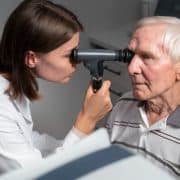What Are the Two Types of Macular Degeneration?
As a person gets older all manner of things may develop in terms of eye health. Many people know to be aware of cataracts, but another eye disease to be aware of is age-related macular degeneration (AMD). This condition is so common that it’s one of the top reasons for vision loss in adults over the age of 50. Now, 50 years of age is by no means elderly, but it’s long enough for this condition to slowly develop and start to be problematic at this time of life. This is why your optometrist always checks for signs of macular degeneration in Jacksonville, FL when you come to visit. It’s for your own good to be diagnosed as early as possible, since macular degeneration has no cure. There are two types of macular degeneration:
Dry Macular Degeneration
Dry AMD is the most common type, accounting for approximately 90% of all cases. It occurs when the macula thins over time as part of the natural aging process, and small yellow deposits called drusen form under the retina. These drusen can accumulate and cause a gradual decline in vision. Symptoms might not be noticeable at first, but over time, as the cells in the macula slowly break down, individuals may notice dimmed or distorted vision, especially when reading.
Wet Macular Degeneration
Wet AMD is less common but much more severe and can lead to faster and more serious vision loss. It develops when abnormal blood vessels grow under the retina and leak fluid or blood, damaging the macula. This type can lead to significant vision loss within days or weeks. Symptoms include visual distortions, such as straight lines appearing wavy, and blind spots in the central vision.
Once you have vision loss from AMD there’s no cure, but your Jacksonville, FL optometrist does have options for stopping its progression. Contact us today for an appointment to learn more.




